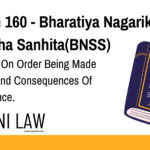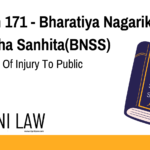Code
“Every police officer may interpose for the purpose of preventing, and shall, to the best of his ability, prevent, the commission of any cognizable offence.”
Explanation:
- Cognizable offense: An offense for which a police officer can arrest a person without a warrant. Examples include murder, robbery, and rape.
- Interpose: To step in or intervene to prevent something from happening.
- To the best of his ability: This clause emphasizes the duty of the police officer to make every reasonable effort to prevent the crime, even if it means using force, as long as it is necessary and proportionate to the threat.
Illustration
Imagine a police officer sees a group of people gathered with weapons, shouting threats and preparing to attack a nearby shop. The officer has reasonable grounds to believe a cognizable offense like robbery or assault is about to take place. Under Section 128, the officer must interpose and prevent the crime, using force if necessary, to ensure public safety.
Common Questions and Answers
Q: Can a police officer use force to prevent a cognizable offense?
A: Yes, but only if it is necessary and proportionate to the threat. The use of force must be justified and reasonable in the circumstances.
Q: What if a police officer fails to prevent a cognizable offense?
A: The officer may face disciplinary action or legal consequences if it can be proven that they failed to act diligently or unreasonably used force.
Q: What are the limitations of this section?
A: The police officer’s actions must be justified and based on reasonable grounds. They cannot arbitrarily detain or use force without justification.








